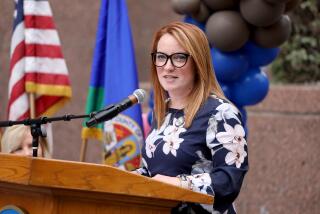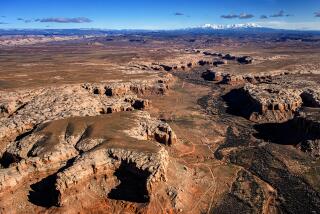Utah Old Boy Network Unravels as ‘Newcomers’ Forge New Frontiers
- Share via
Bill Hedden is one man who never expected to be a player in local politics. A New Jersey-born environmentalist in a Utah county long controlled by miners, Mormons and sagebrush rebels, he remained on the fringe of civic activities in Moab.
But on Feb. 9, Hedden and 13 others will run for seven spots on Grand County’s brand new form of government. Hedden’s opportunity is the result of a bold ballot initiative in November, when angry residents voted to replace their traditional three-member county commission with a nonpartisan, seven-member council.
For the record:
12:00 a.m. Feb. 3, 1993 For the Record
Los Angeles Times Wednesday February 3, 1993 Home Edition Part A Page 3 Column 5 Metro Desk 1 inches; 27 words Type of Material: Correction
Utah voting--In a story Tuesday on Moab, Utah, The Times reported that three counties in the state had voted for Bill Clinton in the November election. In fact, only two did so--Grand and Carbon.
“It’s a new climate,” says Hedden, 42, a carpenter who moved to the area in the mid-1970s. “People were really depressed about politics around here. It was absolute control by the good old boys. All of a sudden, people said, ‘No more!’ It’s like a dam burst.”
The change provides an example of the tensions that emerge when a small Western town gains new residents from urban areas. In many cases, the newcomers bring their own ideas of how to balance environmental and outdoor concerns--ideas that often clash with mining and ranching traditions that have governed local life for generations.
“It’s the end of an era,” acknowledges Sam Taylor, a Moab native who has published the Moab Times-Independent for 36 years.
“Our town has been taken over by people from California, back East and Colorado,” complains Roberta Knutson, chairwoman of the Grand County Republican Party. “They know nothing about Moab.”
Moab, just three miles from Arches National Park and 30 miles from Colorado, in many ways is like a handful of small, scenic communities in the West. A town of 5,000 people, it has witnessed rapid growth in recent years. Founded in 1876 by Mormon pioneers and until recently dominated by ranching and uranium mining interests, it now is, among other things, the “mountain-biking mecca of the West,” according to one outdoors magazine.
Norm Shrewsbury, a photographer who helped form Grand County Citizens for Better Government last fall, says newcomers had a number of complaints. He said the county commissioners had appointed immediate family members to county positions, were suspected of contracting work to businesses in which they had interests and were acting without public participation in key decisions.
But a turning point came last spring, he said, when the commissioners ignored the recommendations of a citizens’ advisory council and hired an insider to head a key promotional post.
“All the past commissioners have been longtime residents who were related to almost everybody in town,” says John Fogg, an insurance agent and president of the Chamber of Commerce, a comparative newcomer who has been in town for 17 years. “They don’t respond to anyone and just do whatever they want.”
One of only three Utah counties to favor Bill Clinton in November’s presidential election, Grand County harbors urban refugees, retirees and year-round recreation enthusiasts.
The Grand County Commission had long rankled environmentalists. In 1980, the commissioners bulldozed a road through an area that was being considered for federal wilderness designation in order to disqualify it.
Many Moabites, recalling the days when mining helped the community prosper, still oppose wilderness designations. Others make known their dislike of mountain bikers and resent the proximity of world-famous national parks such as Arches and Canyonlands.
Typical of the new breed is Susan Ulery, who moved from Portland, Ore., last year and runs an espresso cart on 1st Street North. “I think the commission represented a very narrow slice of political viewpoints in the valley. But more and more of us are moving in, and that old boy network won’t suffice because it doesn’t address our concerns.”
But former Republican county commissioner Jimmie Walker, 64, who serves on the county’s road board, says the referendum was engineered by wilderness advocates. “It hasn’t got anything to do with government.”
More to Read
Sign up for Essential California
The most important California stories and recommendations in your inbox every morning.
You may occasionally receive promotional content from the Los Angeles Times.










